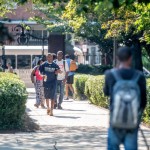By MARTHA MENDOZA
Associated Press
MOUNTAIN VIEW, Calif. (AP) _ The Silicon Valley is leading the rest of the country out of the recession with increased jobs, income and initial public offerings last year, according to a new regional report.
But the 2013 Silicon Valley Index also finds that Hispanics and African-Americans in the world’s high-tech center became increasingly marginalized.
“Our continuing resilience is impressive. Still, the rebound hasn’t been a cure-all for everyone,” said Russell Hancock, president of Joint Venture Silicon Valley, in releasing the report Tuesday.
Silicon Valley saw a 3.6 percent growth rate between 2011 and 2012, compared to 1.7 percent statewide. The region’s quarterly employment rose 4 percent in a year, the sharpest increase in a decade, said the report. Incomes also rose, up 2.2 percent. Hancock said with 92,000 new jobs in a year, the region is “back to what we haven’t seen since the dot com.”
“It’s about to get crazy,” he said.
But the report also underscores growing disparity in the world’s high tech center: African-Americans saw their per capita income fall 18 percent in one year, while Hispanics experienced a 5 percent drop in income. The drops represent a growing divide in a region that for decades boasted a uniquely strong middle class. In the past year, the report finds, households earning more than $100,000 a year increased by 1 percent, and households earning less than $35,000 grew 2 percent.
“All the money here stays with a certain, higher, echelon, and I think that’s how they want it,” said Steve Shaughnessy, who lives in Palo Alto and works in a store selling used CDs and DVDs. “I’m part of the booming poor people.”
Shaughnessy said it’s become increasingly hard to get by on wages earned in retail sales in the Silicon Valley, and that without low-income, subsidized housing, he’d be forced to move away from the place where he’s lived for more than three decades.
Stepping into a nearby restaurant, information technology specialist Sumit Chopra, who lives in Mountain View, said that while he can see the local economic situation has improved, there are some companies that are still shrinking.
“Some are hiring, some are laying off,” he said. “But I’m seeing so many startups and they are hiring like crazy.”
The report shows that 46,000 new businesses opened in the past year, while 12,000 went bust.
Emmett Carson, president of the Silicon Valley Community Foundation, said the economic growth underscores the need for better planning throughout the region.
“With Silicon Valley’s tech economy extending to San Francisco, it’s clear we need to think more broadly about transit, housing, jobs and our long-term economic competitiveness,” he said.










